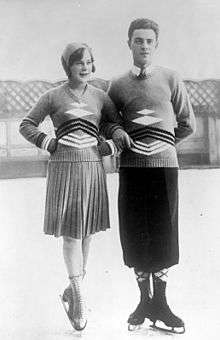Karl Schäfer
Karl Schäfer (17 May 1909, in Vienna – 23 April 1976, in Vienna) was an Austrian figure skater and swimmer. In figure skating, he became a two-time Olympic champion at the 1932 Winter Olympics and the 1936 Winter Olympics. He was also a seven-time World champion (1930–1936) and eight-time European champion (1929–1936). As a swimmer, he competed at the 1928 Summer Olympics in the 200 metre breaststroke.
| Karl Schäfer | |
|---|---|
 Karl Schäfer with Sonja Henie. | |
| Personal information | |
| Full name | Karl Schäfer |
| Country represented | Austria |
| Born | 17 May 1909 Vienna |
| Died | 23 April 1976 (aged 66) Vienna |
Medal record
|} | |
Early life and skating career
Karl Schäfer was born not far from the artificial ice rink of Eduard Engelmann Jr. in Vienna-Hernals. Figure skating coach Rudolf Kutzer first recognized Schäfer's talent when he was 11 years old.
Schäfer won ten consecutive medals at the World Championships and European Championships, including seven and eight consecutive gold medals respectively, an all-time high for consecutive titles in both competitions (Sweden's Ulrich Salchow holds the record for all-time non-consecutive titles, ten World and nine European titles). He competed at the 1928 Winter Olympics and placed 4th. He won back-to-back Olympic titles in men's singles at the 1932 Winter Olympics and the 1936 Winter Olympics.
Schäfer retired from competitive skating in 1936. He moved for a couple of years to the United States, where he worked as a coach. In 1938, he opened a sport store in Vienna. In 1940, he and Herta Wächter (also a figure skating coach) founded the "Karl-Schäfer-Eisrevue" (Karl Schäfer Ice Revue). In 1943, Schäfer became an actor and was the star of the movie The White Dream, which was produced on Engelmann's ice rink in Vienna-Hernals.
After World War II, Schäfer participated in rebuilding the Engelmann's ice rink, and from 1946 on he coached young skaters there. He moved again to the U.S. in 1956 and worked there as a figure skating coach until 1962. In 1962, he returned as a coach to Vienna-Hernals and lived and worked there until he died.
The Karl Schäfer Memorial was a figure skating competition named after him that was held in Vienna from 1974 to 2008.
Swimming career
Schäfer was the Austrian breaststroke champion several times. He competed in the 1928 Summer Olympics and was eliminated in the semi-finals of the 200 metre breaststroke event.
Personal life
Schäfer played the violin very well. He married Christine Engelmann, the youngest daughter of Eduard Engelmann Jr. He was the brother-in-law of Helene Engelmann.
Results
Figure skating
| International | ||||||||||
|---|---|---|---|---|---|---|---|---|---|---|
| Event | 1927 | 1928 | 1929 | 1930 | 1931 | 1932 | 1933 | 1934 | 1935 | 1936 |
| Winter Olympics | 4th | 1st | 1st | |||||||
| World Championships | 3rd | 2nd | 2nd | 1st | 1st | 1st | 1st | 1st | 1st | 1st |
| European Championships | 3rd | 2nd | 1st | 1st | 1st | 1st | 1st | 1st | 1st | 1st |
| National | ||||||||||
| Austrian Championships | 2nd | 2nd | 1st | 1st | 1st | 1st | 1st | 1st | 1st | |
References
- "ISU Official Results: Olympic Games: Men's Singles" (PDF). Archived from the original on 2013-05-13.CS1 maint: BOT: original-url status unknown (link)
- "ISU Official Results: World Figure Skating Championships: Men's Singles" (PDF). Archived from the original on 2013-12-05.CS1 maint: BOT: original-url status unknown (link)
- "ISU Official Results: European Figure Skating Championships: Men's Singles" (PDF). Archived from the original on 2011-06-03.CS1 maint: BOT: original-url status unknown (link)
| Wikimedia Commons has media related to Karl Schäfer. |